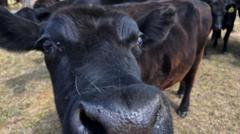Can Dog Owners Help Reduce Cattle Abortions?

Understanding Neospora: The Threat to Cattle Welfare
Neospora caninum is a parasite that poses significant risks to cattle welfare, leading to a range of reproductive issues including abortions, stillbirths, and infertility. This parasite is primarily transmitted through dog feces, making it a pressing concern for farmers across Britain. According to experts, dog waste is responsible for approximately 20% of cattle abortions, highlighting the critical need for awareness and preventive measures among dog owners.
The impact of Neospora on livestock is profound. Research conducted by Aberystwyth University indicates that there has been little improvement in the situation over the past decade. This lack of progress suggests that the message about the dangers posed by this parasite is not being effectively communicated to dog owners. Brian Thomas, a farmer from Pembrokeshire, experienced firsthand the devastating effects of Neospora, losing one-third of his breeding cattle to this parasite.
The Mechanism of Infection
Neospora caninum is transmitted when cattle graze on contaminated pasture that contains oocysts from infected dog feces. Once ingested, the parasite can lead to severe reproductive problems in cows. This cycle not only affects the individual animals but also has broader implications for the cattle industry as a whole.
Here are key points regarding the mechanism of infection:
- Consumption of Oocysts: Cattle become infected by consuming feed or grazing on grass contaminated with the parasite's oocysts.
- Asymptomatic Carriers: Dogs can carry Neospora without showing symptoms, complicating detection and prevention efforts.
- Reproductive Risks: The presence of Neospora in pregnant cows can lead to abortions and stillbirths.
Brian Thomas's Experience
Brian Thomas's farm serves as a stark example of the toll Neospora can take. With a public footpath running through his land, he faces challenges in managing dog waste. "Dog feces can cause problems in cattle, leading them to abort," he explains. After testing his herd, he found that 10 out of 30 breeding cattle were positive for Neospora, highlighting the parasite's prevalence.
The costs associated with testing and managing the herd are significant. Each test for Neospora can cost around £30 per cow, which adds up quickly when testing an entire herd. This financial burden, coupled with the emotional toll of losing livestock, underscores the urgent need for awareness and action.
Prevention Strategies for Dog Owners
Preventing the spread of Neospora starts with responsible dog ownership. Here are several effective strategies that dog owners can implement:
- Always Clean Up After Your Dog: Ensure that you pick up your dog’s waste immediately and dispose of it properly.
- Educate Yourself: Understand the risks associated with Neospora and how it can impact local livestock.
- Avoid Walking Dogs Near Farmland: Keep your dogs away from areas where cattle graze, especially during pregnancy.
- Encourage Others: Spread the word among fellow dog owners about the importance of cleaning up after their pets.
The Role of Veterinary Clinics
Veterinary clinics, such as the Wales Veterinary Center, have taken the initiative to highlight the importance of managing Neospora. They report that the parasite is responsible for about half of the abortions they handle, emphasizing the critical need for awareness among dog owners. Veterinarians are calling for more rigorous public education campaigns to inform dog owners about the risks associated with leaving dog feces unattended.
Bev Hopkins, a veterinarian at the center, notes that the number of abortions related to Neospora is "devastating" for farmers. "In the last decade, we have seen that half of the abortions are due to the presence of Neospora," she stated. Her call to action encourages dog owners to take immediate responsibility for their pets' waste, particularly in fields where cattle are present.
Community Awareness and Action
Raising community awareness is crucial in combating the spread of Neospora. Local organizations and agricultural bodies can play an essential role in disseminating information about the parasite and its effects. Initiatives could include:
- Public Workshops: Host educational sessions for dog owners on the importance of cleaning up after their pets.
- Information Campaigns: Utilize social media and local news outlets to promote awareness about Neospora and its implications.
- Collaboration with Farmers: Encourage partnerships between dog owners and local farmers to create a mutual understanding of the risks involved.
The Importance of Testing and Monitoring
Regular testing and monitoring of livestock for Neospora is essential for early detection and management. Farmers should work closely with veterinarians to establish testing protocols for their herds. This proactive approach can help identify infected animals and mitigate the risks associated with the parasite.
Additionally, maintaining detailed records of testing results and any incidents of abortion can help farmers track the prevalence of Neospora on their farms. This data can be invaluable for making informed decisions about herd management and biosecurity measures.
Conclusion
The threat posed by Neospora caninum to cattle welfare cannot be overstated. As dog owners, farmers, and veterinarians work together to raise awareness and implement preventive measures, the overall health of livestock can improve significantly. By taking responsibility for dog waste and educating ourselves about the risks, we can contribute to a healthier agricultural environment.
As we move forward, it is crucial to consider how our actions impact not only our pets but also the broader ecosystem of farming and livestock health. Are we doing enough to protect our cattle from preventable issues like Neospora? The responsibility lies with each of us to ensure a safer future for all.
FAQs about Neospora and Cattle Welfare
What is Neospora caninum?
Neospora caninum is a parasitic protozoan that primarily affects cattle, leading to reproductive issues such as abortions and infertility. It is transmitted through contaminated dog feces.
How does Neospora affect livestock?
Neospora can cause significant reproductive problems in cattle, including abortions, stillbirths, and reduced fertility rates. These issues can have serious economic implications for farmers.
What can dog owners do to prevent the spread of Neospora?
Dog owners can prevent the spread of Neospora by cleaning up after their pets immediately, educating themselves about the risks, and avoiding walking dogs near farmlands.
Why is community awareness important in managing Neospora?
Community awareness helps promote responsible dog ownership and encourages collaboration between dog owners and farmers, ultimately reducing the risk of Neospora transmission.
As we reflect on the information shared, how can you contribute to a safer environment for livestock and pets alike? #Neospora #CattleWelfare #DogOwnersResponsibility
Published: 2025-08-19 05:10:47 | Category: wales



